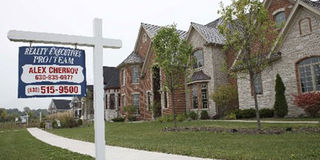How about a rent policy to solve housing crisis?

Homeownership produces greater urban sprawl.
Access to housing is emerging as one of the most daunting challenges of the 21st Century in many African countries.
The continent is increasingly getting urbanised, pushing up the demand for affordable and decent housing, says James Mugerwa, the managing director of Shelter Afrique.
“Within this in context, it is rather amazing that rental housing seems to have been forgotten in many housing policies,” he complains.
“Rental residential markets remain relatively underdeveloped in sub-Saharan Africa, outside of South Africa, whereas homeownership has been the object of all the attention by public policy makers and the private sector.”
Mr Mugerwa advises that with about 90 per cent of Africa’s population unable to buy a house or even qualify for a mortgage, there is a need to make a serious mental shift towards formal rental housing as a viable option to solve the housing crisis.
His view is that the general lack of rental housing policies has contributed to more people living in poor, informal conditions. They are forced to rent shelter from an informal market, where no regulation exists, and where the demand largely exceeds the supply.
“This is why the formal rental sector is deserves greater attention and expertise, as properly developed rental markets can play a formidable role in promoting affordable and decent housing in Africa, especially at the lowest income levels,” says the Shelter Afrique boss.
A panel discussion in Nairobi on August 5 chaired by the organisation to discuss issues affecting housing in Africa agreed that the future of housing in the continent was pegged on a shift in focus towards the rental system.
The discussions involved government officials, private property owners, financiers and non-governmental organisations in the housing sector.
At the end of it, various advantages of establishing a formal rental housing framework were outlined.
They include greater flexibility for tenants, such as the ability to choose housing that better fits the family budget, and the freedom from responsibility of home maintenance.
Tenants also experience less financial stretch compared to homeownership, as upfront costs are significantly fewer.
They further avoid the many risks of homeownership, such as the potential loss of wealth from falling home values and the financial and personal havoc caused by foreclosure, especially to low and moderate-income households, which often invest a substantial share of their resources in this single asset.
The rental markets also play a key role in enhancing the value of housing assets and in generating revenues from unlocked wealth.
Homeownership produces greater urban sprawl. This is particularly true as housing prices increase and people are forced to move further and further away from city environs.
As such, rental housing would help cities in developing or redeveloping their urban cores, it was argued.
In sub-Saharan Africa, most of the rental houses are privately owned by retail or individual investors, who manage the units themselves, and cannot leverage any form of external finance beyond their own equity.
Moreover, affordable rentals in many urban centres are in the informal sector, in poor conditions and with little security of tenure.
Femi Adewole, the director of portfolio management at Shelter Afrique, thus advises on the need for long-term capital investment in decent and affordable rental homes to establish large-scale real estate markets that are lacking in Africa.
However, the development of such residential rental markets critically depends on the enabling environment of the country as provided for through laws, regulations, taxation and the capacity to raise significant and adequate financial resources from investors and financiers.
“There is a need for the government and investors to flag important policies that will spur housing development,” admitted the principal secretary at the Ministry of Lands and Urban Development, Ms Mariam El Maawy, at the August 5 forum.
The discussion came ahead of the African Housing Conference 2014, to be held in October under the theme: “Formal Rental Housing in Africa: A Critical Option in the Challenge of Providing Affordable for All.”




